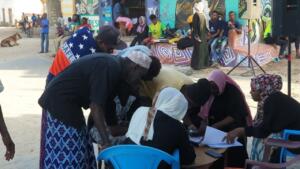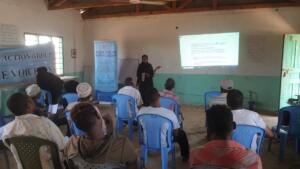Building Capacity of BMUs Phase Two – Final Report
This project run by Faza Youth Action Group (FYAG) started in 2022, aimed to build the capacity of BMUs in Faza Ward, Pate Island through providing training to communities and Beach Management Unit (BMU) boards on the regulations that govern their operations.
Through this training, the project wanted to empower and advocate for the sustainable use and conservation of aquatic resources through proper education and awareness and actions in line within the regulations with regards to the use of illegal gears, observance of seasonal closures and implementation of relevant bylaws.
Overview of Activities
To kick off the project, the group arranged for the translation of the BMU Regulations from English into Kiswahili. As most fishermen and BMU members don’t speak or read English, prior to this translation, there was a very limited understanding of the regulations. Through the translation and subsequent trainings, FYAG aimed to ensure that the regulations were properly implemented.
To do this, the group ran a total of 4 capacity building trainings in the following villages across Pate Island; Faza, Tchundwa, Kizingitini, Mbwajumwali, Myabogi, Shanga Ishakani and Rubu, Siyu, Pate and Mtangawanda. BMU committee members, fishermen and government officials were invited to the trainings.
In conjunction with the meetings, street law forums for the fishermen and general public were held for everyone to understand the regulations. These forums were key as most people in Pate, are involved in fishing activities. And by having more people aware of the regulations and their rights they are more able to hold the BMU committees to account.
The project showed BMUs are viable institutions, it is clear the poor structure and management of BMU along with the challenges faced in implementing the stipulated regulations lead to their ineffectiveness. The participants were taken through the translated regulation where most of them had not had the opportunity to go through the regulation. Where most of them agreed the translated regulation it will reduce the challenges in the performance of their duties, with most BMUs are not conversant with the regulation. The translated regulation into Kiswahili were distributed among the BMU committees and fishermen. With each represented department given 50 copies for their offices and also assisting in domesticating their regulations to suite their village capacity as the highest number of fishermen cant read and write, the translated regulation will assist the committee to implement and perform their duties as required.

Review of Outcomes
The project showed BMUs are viable institutions as many within the committees were willing to improve their management as it was clear that the poor structure and management and the challenges faced in implementing the regulations lead to their ineffectiveness. By taking participants through the regulations in their own language it was agreed that the it would reduce the challenges in the performance of their duties.
To ensure that communities could continue to hold their leaders to account Kiswahili regulations were distributed among the BMU committees and fishermen. With each department given 50 copies for their offices. Further assistance was offered to specific areas in domesticating their regulations to suit their villages among those that are illiterate.
Furthermore, the BMUs also agreed to reinvigorate their environmental units within the committees. Under the regulations environmental units are responsible for implementing conservation projects and activities such as community clean ups and providing education on sustainable fishing. However, these units had become dormant due to poor management and little awareness on the importance of protecting the environment.

Conclusion
Overall, the project had good results in raising more awareness of what BMUs are responsible for doing and ensuring that community members can hold them to account when they are not acting in the interests of the wider community. However, breaking the current culture of BMU committees acting only in self-interest is an uphill battle and won’t be solved overnight.
While the project period has ended, FYAG have established themselves as a reliable source of information on how BMUs should be managed in Pate Island and continue to play a vital role in holding committees to account.
LEF looks forward to working with FYAG again for the sustainability of our fisheries now and in the future.
PLUS, if you want to help your community, you can get your copy of the translated BMU regulations below.
